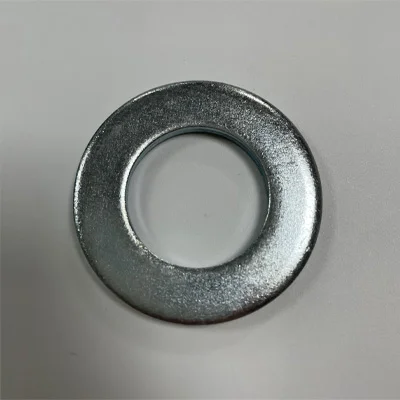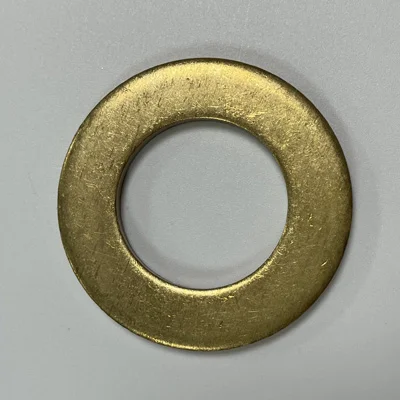caTEGORIES
Tags
How Temperature and Humidity Affect the Performance of Washers in Industrial Settings

Posted: August 15, 2025
Categories: News
Tags: news
In industrial work, small parts like washers play a huge role. These flat or springy discs help keep bolted joints strong. But many people forget how the environment, like heat or damp air, can change how washers work. Temperature and humidity can hurt their performance, especially in tough conditions. Picking the right washer for the job can stop problems and make your projects last longer.
At QEWIT, we make strong, reliable fasteners, including washers built for all kinds of environments. This guide explains how heat and moisture affect washers and how to choose the best ones for your projects.
Why the Environment Matters for Washers
Washers do important jobs: they spread out pressure, stop bolts from loosening, and protect surfaces. But their strength doesn’t just depend on how they’re made. The weather around them, like heat or wet air, can make a big difference.
What Washers Do
Washers help bolts hold things tightly, from big steel structures to tiny electronics. But in hot or wet places, the wrong washer can rust, weaken, or break.
Tough Conditions to Watch For
Some industries, like ships, oil rigs, air conditioning systems, or building sites, face rough environments. These include:
- Hot air or surfaces
- Wet, humid air
- Salty air near the ocean
- Dirty air from factories or acid rain
How Heat Affects Washers
Heat changes materials in ways that can hurt washers. Here’s what happens when things get hot:
Growing Bigger
When metal gets hot, it expands. If a washer and bolt expand at different rates, the joint can loosen. This is a problem in places where things move or shake a lot.
Getting Softer
Some metals, like plain carbon steel, get softer in high heat. A soft washer can’t hold things tightly. It might sink into the surface it’s supposed to protect.
Wearing Out
Hot and cold cycles make washers expand and shrink over and over. This can make them tired, leading to cracks or bending out of shape.
Example: In engine rooms or metal foundries, where it’s hotter than 150°C, regular flat washers might bend or break. QEWIT suggests using strong, heat-treated flat washers (DIN 125A) made of stainless steel or alloy with a hardness of 200HV or more.

How Humidity Hurts Washers
Wet air adds more challenges. Moisture can start rust and cause other problems for washers.
Rusting Fast
Carbon steel washers without coatings rust quickly in damp air. Rust weakens them, so they can’t hold weight well.
Rust from Mixed Metals
When different metals touch in wet conditions, one might rust faster. This is called galvanic corrosion. Using brass or zinc-plated steel washers can help in some cases.
Mold or Germs
In places like food factories or air conditioning units, wet air can grow mold or germs around rubber or nylon parts in washers. You need to pick materials that stay clean and safe.
Example: In coastal wind farms or docks, washers face salty air all the time. QEWIT offers HDG (hot-dipped galvanized) or Elementech 1000-coated washers. These pass 1000 hours of salt spray tests, perfect for outdoor or beach areas.
Choosing the Right Washer Materials
QEWIT provides washers in different materials and coatings, each good for specific conditions:
- Stainless Steel (A2, A4): Resists rust and handles heat well. Great for food, marine, or chemical jobs.
- Carbon Steel (140HV, 200HV): Strong and cheap. Best for dry, indoor use.
- Brass or Copper: Good for electrical parts and resists rust. Also used for looks.
- Zinc-Flake or HDG Coated: Lasts long in wet or salty air. Ideal for outdoor projects.
Coatings to Protect Washers
- Zinc Flake: Stops rust and wear, great for tough conditions.
- HDG (Hot Dipped Galvanized): Thick coating for outdoor use.
- Black Oxide or GEOMET: Good for looks and some rust protection.
How QEWIT Tests Washers
QEWIT doesn’t just sell washers—we make sure they’re strong and reliable. Our tests include:
- Salt spray tests (ASTM B117) to check rust resistance
- Strength tests to measure how much weight they handle
- Hardness tests (Vickers, Rockwell) to ensure toughness
- Coating thickness checks to confirm protection
- Load tests to prove they won’t fail
We also offer certifications like:
- ISO 9001 quality standards
- DIN-EN-10204 3.1 certificates
- PPAP Level 3 documents
- Initial Sample Inspection Reports (ISIR)
These ensure every washer, standard or custom, works in your specific environment.
Tips for Picking Washers
To choose the right washer, think about where it will be used:
Indoor vs. Outdoor
- Indoor: Carbon steel or zinc-plated washers are fine for dry places.
- Outdoor: Use stainless steel, HDG, or Elementech-coated washers to fight rust.
Still vs. Moving Loads
- Still Loads: Flat washers are usually enough.
- Moving or Shaking Loads: Use lock washers or spring washers to keep things tight.
Temperature Ranges
- Below 100°C: Most carbon steel washers work well.
- 100°C to 300°C: Choose heat-treated carbon steel or stainless steel washers.
- Above 300°C: Talk to QEWIT for special alloy washers.
Adding More Details for Better Performance
Choosing the right washer isn’t just about size or material. You also need to think about how it fits into the whole system. For example, in a bolted joint, the washer works with the bolt and nut to keep everything tight. If the washer fails, the whole joint can loosen, causing damage or safety risks.
In hot environments, like near engines or in factories, you might need to check the washer’s thickness and hardness regularly. Heat can make washers thinner over time, especially if they’re not made for high temperatures. QEWIT’s heat-treated washers are built to stay strong even in these tough conditions.
In wet places, like near the ocean or in rainy areas, rust is the biggest enemy. A good coating, like Zinc Flake or HDG, can make a washer last years longer. QEWIT tests these coatings to ensure they stand up to salt and water, so you don’t have to worry about replacing parts too soon.
In some industries, like food processing, cleanliness is critical. Washers with rubber or nylon inserts need to resist mold and be easy to clean. QEWIT offers washers designed for these environments, ensuring safety and hygiene.
Why Choosing the Right Washer Saves Money
Picking the right washer does more than keep things safe. It saves time and money by avoiding repairs or replacements. A washer that rusts or breaks can cause big problems, like loose joints or damaged equipment. By choosing washers that match your environment, you ensure your projects stay strong and last longer.
Final Thoughts
Temperature and humidity aren’t small details—they can make or break your washers’ performance. Heat can weaken or warp washers, while moisture can cause rust or mold. By picking the right materials and coatings, you can protect your projects from these risks.
QEWIT’s huge catalog, with over 30,000 products, includes washers for every situation. From standard DIN 125A flat washers in carbon steel to spring washers with exact hardness or custom, rust-proof designs, we have what you need. Our expert team, in-house testing, and ISO certifications ensure your washers won’t fail, no matter how hot or wet the environment gets.
Contact QEWIT today to check out our washer options or request samples for testing.
FAQs
Q1: Which washer is best for hot places like engines or HVAC systems?
A: Heat-treated stainless steel or alloy washers with hardness above 200HV work best. QEWIT’s DIN 125A washers are made for these conditions.
Q2: What coating is best for wet or ocean areas?
A: Use HDG, Zinc Flake, or Elementech 1000 coatings to protect washers from rust in damp places.
Q3: Can QEWIT provide test reports or certifications for washers?
A: Yes, we offer 3.1 certificates, PPAP documents, and in-house test reports for salt spray or strength upon request.


